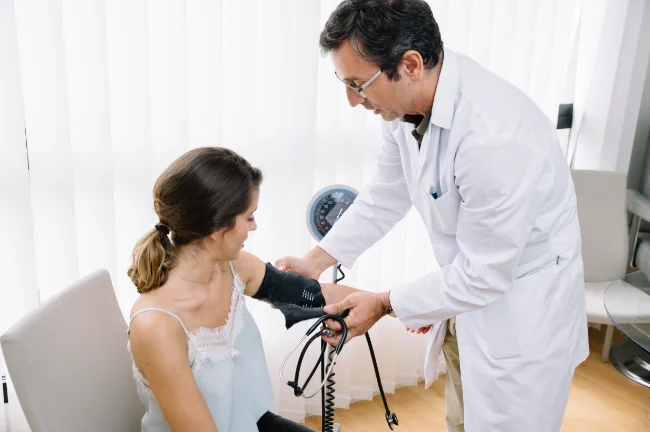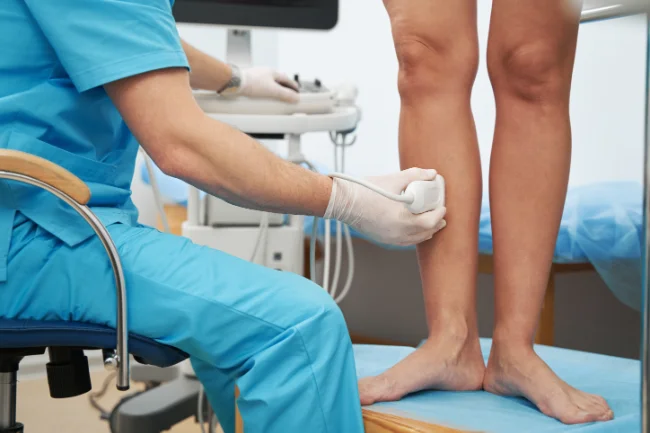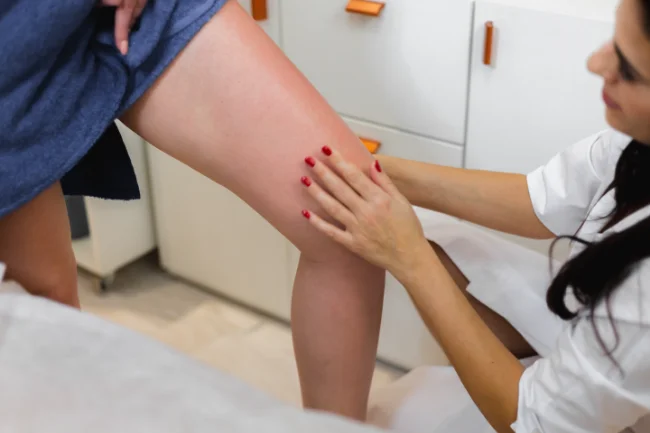Varicose Veins
We offer comprehensive varicose vein treatments. We diagnose the condition using ultrasound evaluation, and when clinically indicated, we perform the most effective and minimally invasive treatments to close the “bad” veins.
Varicose veins are enlarged, twisted veins that typically appear just under the surface of the skin, most commonly in the legs and feet.
They occur when the valves in the veins that help regulate blood flow become weak or damaged, causing blood to pool and the veins to swell. Varicose veins can be blue or dark purple and often cause symptoms such as aching, heaviness, swelling, and discomfort in the affected area.
Pre-Procedure

To prepare for varicose vein ablation treatment, you should follow these steps and expect the following components in the pre-procedure workup:
- Consultation: Have an initial consultation with Dr. Vuppuluri provider to discuss your symptoms, medical history, and treatment options.
- Imaging: An ultrasound study of the lower extremity veins will be performed to identify the non-functional veins
- Medication Review: Inform your primary care physician about any medications, supplements, or herbal products you are taking. You may need to stop certain medications, such as blood thinners, before the procedure.
- Pre-procedure Instructions: Follow any specific instructions given by your healthcare provider.
One Week Prior:
Discontinue blood thinners (e.g., aspirin, warfarin) as advised by your doctor. Avoid non-steroidal anti-inflammatory drugs (NSAIDs) such as ibuprofen and naproxen.
Inform your doctor about any new medications or supplements you are taking.
24-Hours Prior:
Drink plenty of fluids to stay well-hydrated (unless otherwise directed).
Avoid shaving or waxing your legs 24 hours before the procedure to prevent skin irritation.
Day of the Procedure:
- Bathing: Take a shower and clean the area to be treated with antibacterial soap. Avoid applying lotions, oils, or creams to your legs.
- Clothing: Wear loose, comfortable clothing to the appointment. Bring compression stockings if instructed, as you may need to wear them immediately after the procedure.
- Transportation: Arrange for someone to drive you to and from the procedure, as you may be advised not to drive afterward.
- Arrival Time: Arrive at our office 15-20 minutes early to complete any necessary paperwork and prepare for the procedure.
- Relaxation: Try to relax and avoid stress on the day of the procedure as well as 24-48 hours following.
The Procedure

What can I expect during a vein ablation procedure?
By following these steps and understanding the pre-procedure workup, you can ensure you are well-prepared for your varicose vein ablation treatment.
- Medical History and Examination: Dr. Vuppuluri and his team will go through your medical history and conduct a physical examination.
- Ultrasound Examination: A Doppler ultrasound will be performed to map the veins and assess the severity and extent of the varicose veins.
- Blood Tests: Basic blood tests may be ordered to ensure there are no underlying issues that could complicate the procedure.
- Pre-procedure Instructions: You will receive detailed instructions on how to prepare for the procedure, including what to wear, when to arrive, and any specific steps to follow on the day of the treatment.
- Consent Form: You will be asked to sign a consent form acknowledging that you understand the procedure, its risks, and benefits.
Post-Procedure

By understanding these post-procedure expectations, you can help ensure a smooth recovery and the best possible outcome from your varicose vein ablation treatment.
Always follow your healthcare provider’s specific instructions for your care.
Immediately Post-Procedure:
- Observation Period: You will be monitored for a short period to ensure there are no immediate complications.
- Compression Stockings: You will be asked to wear compression stockings to help reduce swelling and promote healing.
- Bandages: Small bandages will be applied to the treatment sites.
The First 24 Hours:
- Activity: Avoid strenuous activities and heavy lifting. Walk around for short periods to promote blood flow.
- Pain Management: You may experience mild discomfort, bruising, or swelling, which can be managed with over-the-counter pain relievers such as acetaminophen or ibuprofen.
- Elevate Legs: Elevate your legs when resting to reduce swelling.
The First Week:
- Compression Stockings: Continue wearing compression stockings as directed, usually for at least a week.
- Daily Activities: Resume most of your normal activities, but avoid strenuous exercise and heavy lifting.
- Follow-up Care: Attend any scheduled follow-up appointments to monitor your progress.
Long-term Recovery:
- Gradual Resumption of Activities: Gradually resume more strenuous activities and exercise as advised by your healthcare provider.
- Monitor for Complications: Watch for signs of complications, such as excessive swelling, bleeding, infection, or severe pain, and contact your doctor if these occur.
- Improvement in Symptoms: You should notice an improvement in symptoms such as pain, swelling, and the appearance of varicose veins over the following weeks to months.
Follow-up Appointments:
- Ultrasound Examination: An optional follow-up ultrasound may be scheduled to ensure the treated vein has closed properly and there are no complications.
- Additional Treatments: Some patients may require additional treatments for complete relief.